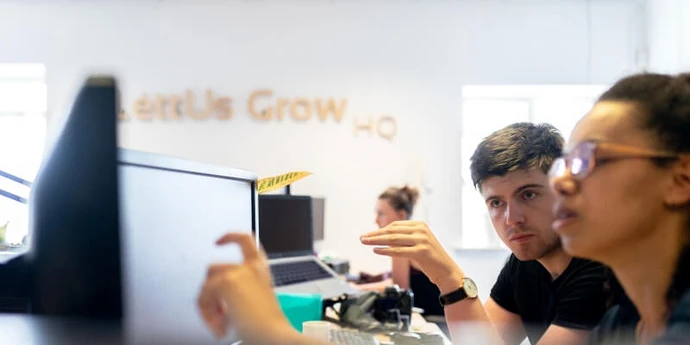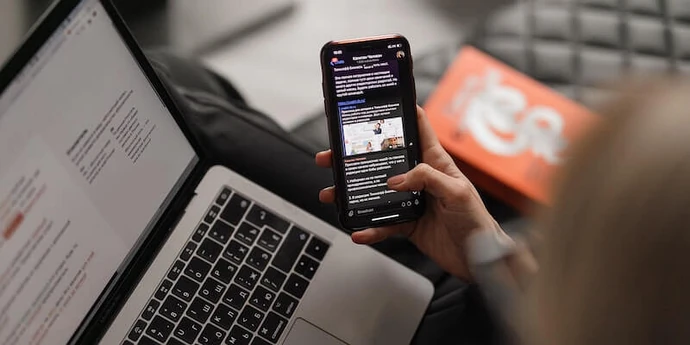No matter what role you're applying for, Meta interview questions are tough. To get the job, your answers will need to be outstanding.
If that sounds daunting, don't worry, we're here to help. We've helped thousands of candidates get jobs at Meta and we know exactly what sort of questions you can expect in your interview.
Below, we'll go through the most common Meta interview questions and show how you can best answer each one.
- Top 5 Meta interview questions
- More Meta interview questions
- How to prepare for a Meta interview
- Meta interview FAQs
- Practice Meta interview questions
Click here to practice 1-on-1 with ex-Meta interviewers
Let’s dive right in!
1. Top 5 Meta interview questions ↑
We host more than 100 Meta ex-interviewers on our platform and they have helped hundreds of candidates get job offers at Meta through our coaching services.
These five questions are typical for Meta interviews and you’ll need to be prepared for them. We’ll show you why interviewers ask them and how to answer them, with an example answer for each question.
1.1 “Why do you want to work at Meta?”
This is often one of the first questions you’ll be asked.
Why interviewers ask this question
Interviewers ask, “Why do you want to work at Meta?” to find out how much motivation you have to last in the company’s fast-paced environment.
At Meta, you’ll be working on projects that will potentially impact millions of users. The work environment is very intense and dynamic, where things must be done well and fast. You’d need to show enough motivation to thrive at Meta.
Also, as they make major decisions based on data, they’re looking for candidates who know how to do research and gather facts.
Showing up on interview day with a clear list of specific reasons on why you’d like to work for Meta is a good way to show the interviewer that you fit the profile they’re looking for.
How to answer this question
In answering this question, avoid giving unstructured, too broad, and too long answers. To prepare well, we recommend that you do these:
- Network: Long before your interview, connect and build rapport with current Meta employees. Ask them what it’s like working there, why they chose Meta, and what is unique about it. Their answers will give you ideas for your own answer. Also, mentioning their names during your interview shows the interviewer that you’ve put in extra effort to get to know their company better.
- Personalize: If you’ve had personal experience with Meta in any way, such as using a Meta product that shaped how you see the world, or being part of a Meta initiative that has made a difference in your life, talk about it. Also talk about what you value most about Meta and at least one of its products.
- Bring your unique perspective: On its online application platform, Meta asks, “How will your lived experiences (educational, professional, military, or otherwise) help you offer our product teams a new perspective as we continue to iterate our products?” Think about this and how you can include it in your answer to “Why Meta?”
- Make it specific: Your answer should apply only to Meta and not any other company. If your answer can easily be used for other companies by just swapping the company names, it’s still too broad and you need to keep working.
- Give more than one reason: Aim for two to three concise reasons related not only to Meta but also to your possible position and team in the company. More than these would make your answer too long; giving only one reason is not a strong enough answer.
- Talk about your team: Some of the reasons you may want to work for Meta as a whole need to be specific. Talk about the team and the role that you’re applying for, and why they’re a perfect fit for you.
- Keep it sincere and balanced: While you want to show enthusiasm for working with Meta, give real reasons and not offer empty compliments.
Example answer
Here is an example answer suggested by Damien, a former Meta product manager:
Question: "Why do you want to work at Meta?"
Answer:
“Meta, as many people know, is a great innovative company at the forefront of technology doing a lot of interesting things with really great and smart people, but this does apply to a lot of companies within technology.
More specifically, I’ve done some research talking to people at Meta and they have great reviews of the work culture, the ability to have impact, the transparency at the company, and how they feel empowered to lead and drive strategy for their team. This is really appealing to me because when it comes to the big thing, I really connect with the mission of Meta.
I’m a first-generation American. My family is from the Caribbean. The ability to stay in contact, relate, and keep in communication with others has really been important in my life as a child. Now, my family uses tools like WhatsApp and Facebook to stay in touch with family back in the islands.
I really like that Meta is committed to building community and connections, and not just about telecommunications and content creation. I really connect with this mission of bringing the world together and creating more connections.
The personal references I’ve got come from employees who seem to really enjoy their jobs. I’m very interested in the technology and work that Meta does, including the Metaverse, in building more communities. Helping people remotely and non-remotely is really important. This is why I’d love to join Meta.”
1.2 “Tell me about a time you dealt with a conflict."
Meta typically asks this type of behavioral question during the initial screens or in the getting-to-know-you interview at onsite/full loop stage.
A behavioral question is one that tests your past behavior as a way of predicting future behavior. Any question that starts with 'Tell me about a time' is a behavioral question, and you can expect plenty of these at Meta.
Why interviewers ask this question
Meta wants to find out if you’re able to collaborate well with cross-functional partners and teams. Dealing with conflict, be it with peers, managers, or external partners, is a key part of this.
How to answer this question
We’ve developed the SPSIL framework to answer behavioral questions like this. The SPSIL approach has these five steps:
- Situation: Start by giving the necessary context of the situation you were in. Describe your role, the team, the organization, the market, etc. You should only give the minimum context needed for the interviewer to understand the problem and the solution in your story. Nothing more.
- Problem: Outline the problem you and your team were facing.
- Solution: Explain the solution you came up with to solve the problem. Step through how you went about implementing your solution, and focus on your contribution over what the team / larger organization did.
- Impact: Summarize the positive results you achieved for your team, department, and organization. As much as possible, quantify the impact.
- Lessons: Conclude with any lessons you might have learned in the process.
To get a better idea of how our method works, work through the example below.
Example answer
Question: "Tell me about a time you dealt with a conflict."
Answer:
Situation
“Certainly. In my role as an engineering manager at a small startup, I encountered a conflict related to client expectations versus technical feasibility.”
Problem
“We were tasked with developing a cutting-edge feature within a tight timeframe, but as we delved deeper, it became evident that meeting the initial requirements precisely would pose significant technical challenges.
Talking to the account manager I understood that the client was getting increasingly frustrated, even though my engineers were frequently staying late to try and meet deadlines. This frustration was also negatively affecting the relationship between the accounts team and my engineers.”
Solution
“Normally we left client relationships to the accounts team, but in this case, I initiated an in-person meeting involving both our development team and the client stakeholders.
I felt that as the technical experts, we were the best place to explain to them why it was not a good idea to rush the developments through, as they wanted.
During the meeting, we presented a detailed technical analysis, showcasing the current project status and explaining the limitations we were facing. We proposed alternative approaches that could achieve a similar outcome without jeopardizing the stability and quality of the product.”
Impact
“The client really appreciated the detailed explanation and admitted that they hadn't fully understood the complexity of what they were asking for. Having the meeting in person was really helpful too, as it helped create an atmosphere of honesty and trust that had been difficult to achieve in video calls.
After this meeting, we agreed upon a modified solution that balanced their expectations with the technical reality.”
Lessons
“For me, this experience shows that so many instances of conflict and stress are simply the result of misaligned expectations, and can be solved through honest and open communication.
I also realized that empathy is one of the most important skills I can have as a manager. To solve the conflict, I needed to understand the perspectives of my engineers, the client, and the accounts team.
Taking the time to listen and empathize with each viewpoint is crucial in these types of situations."
1.3 “How would you design Instagram?”
This question is one of the top three Meta system design questions.
It is often asked of candidates applying for software engineer, engineering manager, and technical product manager roles at levels L4 and up, at the onsite/full loop interview stage.
In a system design interview, you will be asked to design any major system. The system may not necessarily be a Meta product. You might be asked to draw out your design on a whiteboard, but most candidates use an online drawing tool such as Excalidraw.
Why interviewers ask this question
Meta’s major products such as Facebook, Instagram, and WhatsApp all have more than a billion monthly active users. They need engineers who are able to design systems that are highly scalable.
System design interviews ask you to design distributed systems on a massive scale. Think of availability, core systems, databases, reliability, scalability, storage, partition tolerance, and related concepts.
How to answer this question
We recommend using a system design interview framework that lets you show your interviewers that you have the knowledge they need and you can systematically break a problem down into manageable parts.
This framework has four steps:
- Ask clarifying questions.
- Design high-level.
- Drill down on your design.
- Bring it all together by addressing potential problems and optimizations.
To see how this approach works, work through the example below.
Example answer
Question: "How would you design Instagram?"
Answer:
Ask clarifying questions
Before outlining your design, narrow the scope of the question and seek clarity on the functional and non-functional requirements:
- Are we designing the whole of Instagram, or focusing on one particular part?
- What features are expected? (image sharing, comments, likes, etc.)
- What scale are we talking about? (daily active users, uploads per second, etc.)
Design high-level
Lay out the main components of your design, considering:
- How will your system handle image uploads and efficiently serve them to users?
- What kind of database will you use to store images and user data?
- How will you ensure a seamless user experience while maintaining scalability?
Drill down
Dig deeper into the architecture and components:
- Define the architecture for image storage and retrieval.
- Discuss the use of caching mechanisms to enhance performance.
- Explore the choice of databases (SQL, NoSQL) and justify your decision.
- Break down the handling of user interactions (likes, comments) and notifications.
Bring it all together by addressing potential improvements and optimizations
- Identify possible bottlenecks in your design and propose solutions.
- Discuss how you could enhance the system's scalability and responsiveness.
- Consider future features or technologies that could be integrated for improvement.
For a more complete answer, see this post by Nikhil Guptag or watch the Gaurav Sen video below.
To prep fully for the system design part of your interview, check out our Meta system design interview guide.
1.4 “Given an array nums of n integers where n > 1, return an array output such that output[i] is equal to the product of all the elements of nums except nums[i]."
Array (and String) questions are the most common coding questions asked at Meta for engineer roles, so be ready for them.
Meta interviewers ask coding questions at onsite interviews and these are more difficult than those from the initial technical screen.
Why interviewers ask this question
Meta software engineers solve some of the most difficult problems the company faces with code. It's therefore essential that they have strong problem-solving skills.
You'll face two coding interviews and you'll need to show that you think in a structured way and write code that's accurate, bug-free, and fast.
Judging by reports from candidates on Glassdoor, the typical difficulty level is "Leetcode medium" although this may increase if you're interviewing at a higher level.
How to answer this question
We've developed a coding interview framework to answer this question well. It only takes four steps:
- Clarify. Understand the question. Ask clarifying questions. Specify assumptions.
- Plan. Find a solution and explain your solution.
- Implement. Optimize the solution, then write the code.
- Test and optimize. Test-run your code, then optimize.
Example answer
Here is an example code answer to the question, "Given an array nums of n integers where n > 1, return an array output such that output[i] is equal to the product of all the elements of nums except nums[i]."
Click here to learn more about Meta coding interviews.
1.5 “Tell me about a time you failed.”
Like the “Why do you want to work at Meta?”, interviewers ask this type of behavioral question in initial screens or during the getting-to-know-you interview at the full loop stage.
Why interviewers ask this question
Meta interviewers ask this question mainly to see if you're good at owning up to mistakes, and if you’re ready to embrace failure as a learning opportunity.
Your interviewer will be looking for you to share stories from your past experience that demonstrate openness, collaboration, and partnership, including how you handle failures.
How to answer this question
Again, for this type of question, we recommend using the SPSIL framework where you discuss your answer in terms of the following:
- Situation
- Problem
- Solution
- Impact
- Lessons
See how this is applied in the example answer below.
Example answer
Question: "Tell me about a time you failed."
Answer:
Situation
"A few weeks into my previous role my manager at the time gave me a small project to run. I saw it as a great opportunity for me to make an impact.”
Problem
“However, I soon started to get confused. I hadn’t taken many notes in the kick-off meeting, so I wasn’t sure which points my manager had already covered.
Furthermore, I had people listed to help me on the project but I was too shy to ask them if they’d made progress. When I eventually did, it turned out they were waiting for my instructions.”
Solution
“In the end, I had to go back to my manager and explain that I was way behind schedule and needed help. She delegated another team member to work on it with me and together we did a good job, but we missed the initial deadline.”
Impact
“It was my chance to impress and I completely failed to take it. I was extremely disappointed with myself.”
Lessons
“Looking back, it was actually an incredibly valuable experience as it made me much better at my job. I started taking more notes in meetings and made an effort to get to know people on other teams so that I’d feel less embarrassed next time I needed something from them.
I also learned to ask more questions at the start of projects to clarify things– that was useful not just for me but for my manager as it helped her get things more defined.”
For more tips, click here to read our guide to answering the "Tell me about a time you failed" question.
2. More Meta interview questions ↑
Here at IGotAnOffer, we believe in data-driven interview preparation.
We've analyzed 170+ software engineer interview questions reported by Meta candidates on Glassdoor, to identify the types of questions that are most frequently asked.
These are coding, system design, and behavioral/leadership types of questions.
2.1 Meta coding interview and system design interview questions
In this section, we’ve listed five more coding interview questions and another five system design questions below for you to practice using the coding interview framework and system design interview framework we’ve suggested.
We’ve also provided links to the coding interview solutions for each question, which you can then compare with yours.
Example coding interview questions
- "Given a non-empty string s, you may delete at most one character. Judge whether you can make it a palindrome." (Solution)
- "Given a Binary Tree, convert it to a Circular Doubly Linked List (In-Place)." (Solution)
- "Given a list of non-negative numbers and a target integer k, write a function to check if the array has a continuous subarray of size at least 2 that sums up to the multiple of k, that is, sums up to n*k where n is also an integer." (Solution)
- "Given two arrays, write a function to compute their intersection." (Solution)
- "A linked list is given such that each node contains an additional random pointer which could point to any node in the list or null. Return a deep copy of the list." (Solution)
Example system design questions
- How would you design a messaging app like WhatsApp or Telegram? (watch expert answer)
- How would you design Facebook Messenger?
- How would you design Facebook's live update of comments on posts?
- How would you design an online collaborative editor (e.g. Google Docs)?
- How would you design a typehead feature (e.g. Google search autocomplete)?
The third type of frequently asked Meta interview questions are leadership questions, which we discuss next.
2.2 Meta leadership questions
Meta is a bottom-up environment, and the interviewer wants to see strong levels of autonomy, ownership, and dealing with ambiguity. Come prepared with stories of how you worked through tough situations.
Here are five frequent leadership questions that Meta tends to ask, according to data from Glassdoor:
- Tell me about a time you struggled on one of your software projects.
- Tell me about a time you led a team.
- Tell me about a time you had to step up and take responsibility for others.
- Tell me about your worst boss and why they were bad.
- How would you advocate for a commitment to a priority, when that priority is not high on someone else's list?
3. How to prepare for a Meta interview ↑
Depending on the specific role you are interviewing for, Meta will ask you any number or combination of coding, system design, and leadership questions.
Here’s a list of our specific Meta role guides you can use in preparing for your Meta interview:
- Meta software engineer interview
- Meta engineering manager interview
- Meta data scientist interview
- Meta research scientist interview
- Meta machine learning engineeer interview
- Meta production engineer interview
- Meta product manager interview
- Meta product designer interview
- Meta account manager interview
- Meta E4 interviews
- Meta E5 interview
- Meta E6 interview
- Meta research engineer interview
4. Meta interview FAQs ↑
We've also covered here below the most frequently asked questions about Meta interviews.
4.1 How difficult is a Meta interview?
Meta coding interviews are known to be very challenging. People typically refer to medium-level to high-level Leetcode questions, which Meta expects you to solve in 35 minutes, excluding pleasantries and your own questions.
If you're an experienced candidate for a senior role, you'll also need to prepare thoroughly for system design and leadership questions.
Click here to learn more about what a real Meta interview experience is like, featuring stories and strategies from successful candidates we've worked with.
4.2 What questions are asked in Meta collaboration interviews?
Meta engineers need to have superb soft skills in order to lead teams and projects and facilitate seamless collaboration between engineers and cross-functional teams.
One of our expert coaches, Pranav, a former Meta engineering manager, told us that Meta looks for the following key traits in engineers:
- How good are they at resolving conflict with their peers, managers, or external teams?
- Do they have a growth mindset? Do they accept feedback openly and work on them to resolve it?
- How well do they deal with ambiguity? How do they bring structure in place when there is none?
- How do they sustain progress despite multiple hurdles?
- How well do they communicate with peers, cross-functional partners, and teams?
So, collaboration interview questions like the five below are often asked:
- How do you manage projects?
- How do you manage your team’s career growth?
- How do you manage difficult conversations?
- How do you manage underperforming employees?
- Describe a tough situation where you demonstrated leadership.
4.3 Is it hard to get into Meta?
Depending on the specific roles, Meta onsite interview success rates can be as low as 5% to as high as 20%.
To increase your chances of Meta interview success, learn more about Meta’s culture, study our specific Meta role guides that we’ve previously listed, and practice one-on-one with former Meta interviewers.
Here’s a list of resources on Meta that can help you:
- Meta's 6 core values
- Facebook’s hacker culture (by Mark Zuckerberg, via Wired)
- Meta annual reports and strategy presentations (by Meta)
- Meta's approach to tech trends (by CB Insights)
- Meta org culture analysis (by Panmore Institute)
- Engineering at Meta
5. Practice Meta interview questions ↑
We've coached more than 15,000 people for interviews since 2018. There are essentially three activities you can do to practice for interviews at Meta. Here’s what we've learned about each of them.
5.1 Learn by yourself
Learning by yourself is an essential first step. We recommend you make full use of the free prep resources on this blog.
Once you’re in command of the subject matter, you’ll want to practice answering questions. But by yourself, you can’t simulate thinking on your feet or the pressure of performing in front of a stranger. Plus, there are no unexpected follow-up questions and no feedback.
That’s why many candidates try to practice with friends or peers.
5.2 Practice with peers
If you have friends or peers who can do mock interviews with you, that's an option worth trying. It’s free, but be warned, you may come up against the following problems:
- It’s hard to know if the feedback you get is accurate
- They’re unlikely to have insider knowledge of interviews at your target company
- On peer platforms, people often waste your time by not showing up
For those reasons, many candidates skip peer mock interviews and go straight to mock interviews with an expert.
5.3 Practice with experienced interviewers
In our experience, practicing real interviews with experts who can give you company-specific feedback makes a huge difference
Find a Meta interview coach so you can:
- Test yourself under real interview conditions
- Get accurate feedback from a real expert
- Build your confidence
- Get company-specific insights
- Learn how to tell the right stories, better.
- Save time by focusing your preparation
Landing a job at a big tech company often results in a $50,000 per year or more increase in total compensation. In our experience, three or four coaching sessions worth ~$500 make a significant difference in your ability to land the job. That’s an ROI of 100x!















